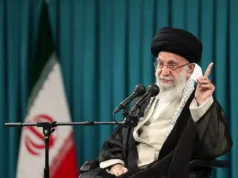President Obama’s major address on the Middle East last Thursday was supposed to highlight America’s vision with regards to the unfolding Arab Spring. Yet that portion of the speech is now long forgotten, buried under the weight of his new and absurd push for Palestinian-Israeli peace. Indeed, the president’s decision to sandbag Israeli Prime Minister Benjamin Netanyahu on the eve of his visit to Washington is perplexing on several levels.
By calling on Israel to accept the 1949 armistice line as the basis for negotiations and including the principle of land swaps, Obama effectively changed four decades of American policy and handed the Palestinian Authority a new starting point for negotiations. U.S. policy was previously based on U.N. Security Council Resolution 242 that called for “withdrawal of Israeli armed forces from territories occupied in the recent conflict” to “secure and recognized boundaries free from threats or acts of force.” This meant that the borders were to be both secure and negotiated — it was not a call for a full Israeli withdrawal to the 1967 line/armistice lines of 1949.
Moreover, by formalizing the principle of land swaps, President Obama is declaring that to solve the territorial conflict, Palestinians are entitled to portions of pre-1967 Israel as well. It is a sad reward to hand to the Palestinian Authority, which walked away from the negotiating table and formed a unity government with the terrorist group Hamas just two weeks earlier.
Barack Obama’s decision to tackle the territorial issue first before dealing with the status of Jerusalem or the Palestinian refugee issue also betrays his fundamental misreading of the conflict. He stated, “we know that peace demands a partner – which is why I said that Israel cannot be expected to negotiate with Palestinians who do not recognize its right to exist…” But Obama apparently does not realize that the reason both Fatah and Hamas are unwilling to make peace is because neither recognizes Israel’s right to exist as a Jewish state. The ostensibly more moderate Fatah faction still clings to the mythology that some 4.8 million refugees and their descendants will return to Israel after a Palestinian state is created.
Yet on this topic, President Obama uttered hardly a word. The heart of the conflict is not about territory or borders; it is about Israel’s existence. If the Palestinian Authority cannot agree that the end of the conflict will result in two states for two peoples, there is precious little to negotiate.
Hamas and Fatah’s decision to work together is designed to bring about the recognition of a Palestinian state at the U.N. in September through unilateral actions. It represents a conscious decision to sidestep negotiations with Israel and to avoid having to make any form of compromise. It is therefore curious that Obama again put the onus squarely on Israel to make progress in negotiations.
The unfortunate truth is that as a result of Obama’s missteps, there has been less movement in the peace process under his watch then at any time since Lyndon Johnson’s presidency. Puzzlingly, this new push comes without having any mechanism in place to begin negotiations. It is yet another strategic blunder and an untimely distraction from what should be the focal point of U.S. policy in the Middle East, namely, bringing Iran’s nuclear program to an end and ensuring that the Arab Spring does not collapse into winter.





